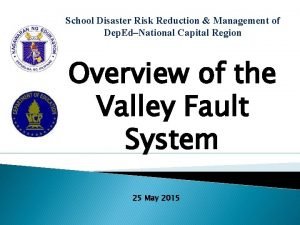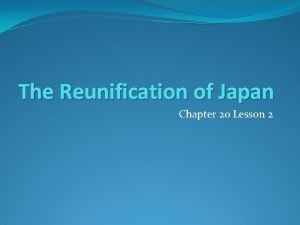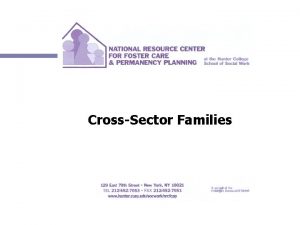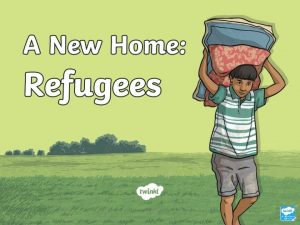Family Reunification Process for Refugee Families Georgina Ramirez









- Slides: 9

Family Reunification Process for Refugee Families Georgina Ramirez

Refugees & Asylum § Refugee status or asylum may be granted to people who have been: § Persecuted or fear they will be persecuted on account of race, religion, nationality, and/or membership in a particular social group or political opinion.

Refugee & Asylum Refugee Asylum Is located outside of the United States � Is of special humanitarian concern to the United States � Demonstrates that they were persecuted or fear persecution due to race, religion, nationality, political opinion, or membership in a particular social group Is not firmly resettled in another country � Is admissible to the United States � � Located inside of the United States or at a U. S. port of entry � Is of special humanitarian concern to the United States � Demonstrates that they were persecuted or fear persecution due to race, religion, nationality, political opinion, or membership in a particular social group Is not firmly resettled in another country � Is admissible to the United States

Immigration Process: Step 1 I-730 Refugee/Asylee Relative Petition § The family reunification process starts with your spouse or parent filing an I-730 petition on your behalf with the Department of Homeland Security U. S. Citizenship and Immigration Services

Immigration Process: Step 2 Preparation for the Immigrant Visa Interview § USCIS (United approves petition, and sends to NVC. § Embassy will give further instruction

Immigration Process: Step 3 The Interview § Consular officer evaluates the family relationship § You will be told weather or not you are eligible § Second interviews may be required for various reasons

Immigration Process: Step 4 Return of Travel Documents § Once eligibility is established, consular officer will retain one’s passport & documents § Travel document is placed in a sealed envelope, and is ready for pick-up § Once picked up, documents cannot be opened by anyone § Travel document is to travel to one’s port of entry into the United States

Why is this Process important? Refugees are reunited with families § Family Reunification brings comfort to refugees in America § Extensive family separation may bring trauma upon refugee families §

References Rouseau, C. , Mekki-Berrada, A. , Moreau, S. (2001). Trauma and extended separation from family among Latin America and African refugees in Montreal. Psychiatry 64(1). � Betancourt, T. t. , Abdi, S. , Ito, B. S. , Lilienthal, G. M. , Agalab, N. , & Ellis, H. (2015). We left one war and came to another: resource loss, acculturative stress, and caregiver-child relationships in Somali refugee families. Cultural Diversity & Ethnic Minority Psychology, 21(1), 114 -125 � Wilmsen, B. (2013). Family separation and the impacts on refugee settlement in Australian Journal Of Social Issues. Australian Social Policy Association 48(2). � Savic, M. , Chur-Hansen, A. , Mahmood, M. A. , & Moore, V. (2013). Separation from family and its impact on the mental health of Sudanese refugees in Australia: a qualitative study. Australian & New Zealand Journal Of Public Health, 37(4). � � Khan, F. (2011). Reunification of the refugee family in south africa: a legal right? . refuge, 28(2). http: //immigration-law. freeadvice. com/immigrationlaw/asylum_refugee_difference. htm � http: //www. uscis. gov/humanitarian/refugees-asylum �

















